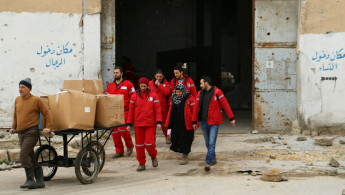Airstrikes hinder Syria aid delivery
Airstrikes in Syria are making it harder to deliver desperately needed aid to civilians suffering from the country's brutal war, the International Committee for the Red Cross [ICRC] said.
"Air bombardment makes it more difficult for us to reach some areas," said the head of the ICRC's Middle East and North Africa operations, Robert Mardini.
| There are reports of displacement in areas in Hama and Homs during military operations, and we are ready to help out in these areas - International Committee for the Red Cross |
"More use of weapons in any conflict will create additional difficulties in the humanitarian situation," he said.
The ICRC had been planning to evacuate wounded from areas in west and northwest Syria as part of a recent ceasefire agreement, "but now it's harder because of air bombardment," Mardini said.
Russia and a US-led coalition are conducting airstrikes in Syria in addition to the Syrian air force's own operations.
Moscow has said it is targeting "terrorists" but has come under fire for striking non-extremist groups and inflicting civilian casualties.
The Syrian Observatory for Human Rights, a Britain-based monitor, said Russian warplanes struck a field hospital in northwest Syria on Tuesday, killing at least 13 people including hospital staff.
Russia angrily rejected the claim as "fake".
The Syrian government earlier this month launched a series of ground operations against anti-regime groups across the country with Russian air cover.
Mardini said recent military operations had displaced more people.
"There are reports of displacement in areas in Hama and Homs during the (recent) military operations, and we are ready to help out in these areas," he said.
Earlier this week, the ICRC led a convoy of trucks delivering food and medical supplies to towns in western and northwest Syria as part of a truce reached at the end of September.
The six-month ceasefire also included the evacuation of wounded civilians from Fuaa and Kafraya, government-held villages in Syria's northwest, and Zabadani and Madaya, rebel-held areas along the border with Lebanon.
Mardini said the conditions for safe evacuation "are not present today, and for this reason we are working on achieving them with all sides.
"What happened in terms of aid provision in recent days was a part of the ceasefire and a very good first step and it helped civilians in that area," Mardini said.
The ICRC is "looking to repeat this operation in other flashpoint and besieged areas" in Syria, including the largely rebel-held area of Eastern Ghouta, near Damascus.
Mardini said his organisation's budget for Syria this year has been their largest operation worldwide and it would be allocated the same budget next year.



